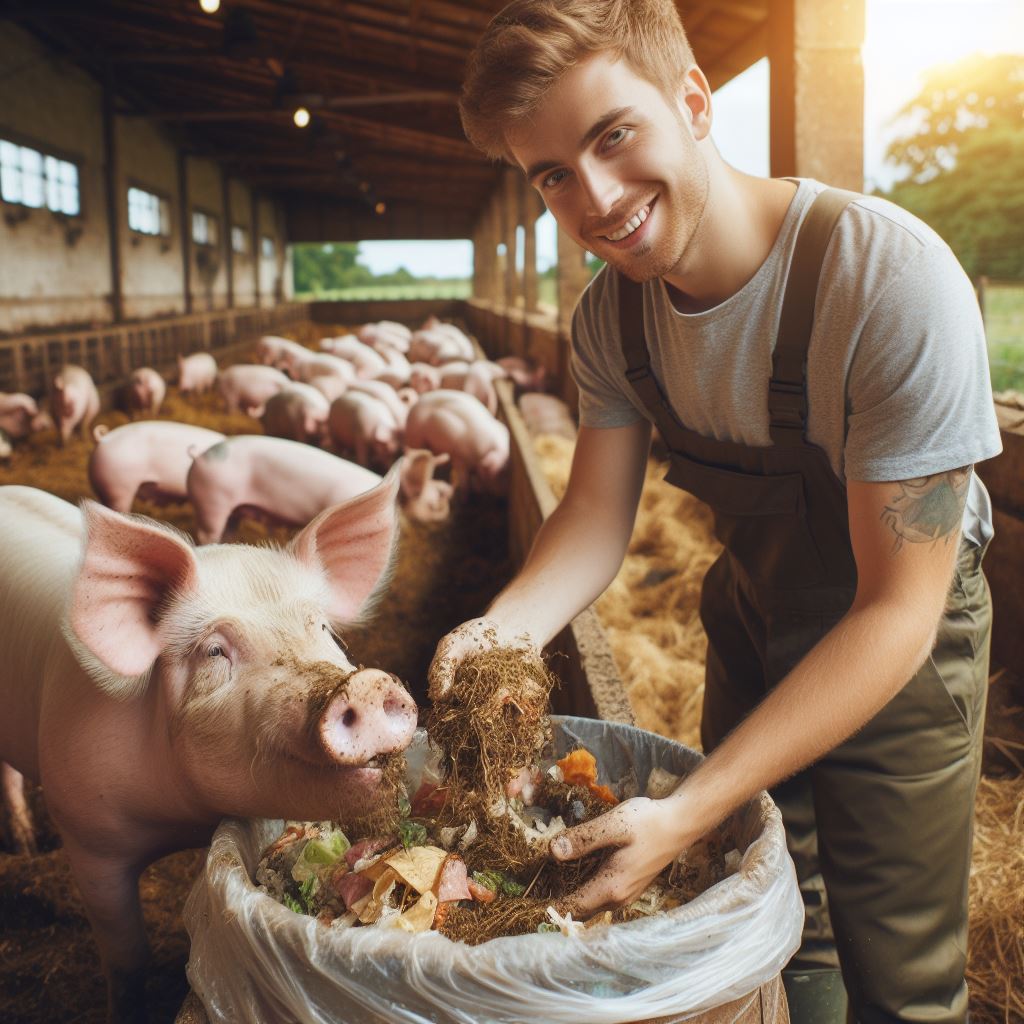Introduction
Importance of organic feed for pig health
When it comes to the health of pigs, organic feed plays a fundamental role.
By providing pigs with organic feed, farmers ensure that these animals receive the necessary nutrients to thrive and maintain optimal well-being.
Organic feed is not just a luxury; it is a necessity.
Brief overview of the benefits of organic feed
The benefits of organic feed are manifold.
First and foremost, it is free from synthetic pesticides, herbicides, and genetically modified organisms (GMOs).
This means that the feed is pure, containing only natural ingredients that enhance the pigs’ growth and development.
Furthermore, organic feed is known to have higher nutritional value compared to conventional feed.
It is packed with essential vitamins, minerals, and antioxidants that support pigs’ immune systems and contribute to their overall health.
Moreover, organic feed eliminates the risk of exposure to harmful chemicals.
Conventionally grown crops may contain residual pesticides, which can accumulate in the pigs’ bodies over time.
Organic feed mitigates this risk, ensuring that the pigs are not exposed to potentially harmful substances.
This leads to not only healthier pigs but also reduces the environmental impact of conventional farming practices.
Therefore, the importance of organic feed for pig health is undeniable.
From providing essential nutrients to reducing exposure to harmful chemicals, organic feed supports the well-being of pigs and contributes to sustainable farming practices.
By choosing organic feed, farmers prioritize the health and welfare of their pigs, ultimately leading to higher-quality pork products for consumers.
Transform Your Agribusiness
Unlock your farm's potential with expert advice tailored to your needs. Get actionable steps that drive real results.
Get StartedWhat is organic feed?
Definition of organic feed
Organic feed refers to feed that is produced using organic farming methods without the use of synthetic pesticides, fertilizers, or genetically modified organisms.
Key characteristics of organic feed
- No synthetic additives: Organic feed does not contain synthetic pesticides, hormones, or antibiotics.
- Non-GMO: Organic feed is made from ingredients that are not genetically modified.
- High-quality ingredients: Organic feed is made from high-quality grains, legumes, and other natural ingredients.
- Trustworthy sourcing: Organic feed comes from certified organic farmers who follow strict guidelines.
- Environmental sustainability: Organic feed production promotes soil health, biodiversity, and conservation.
Regulations and certifications for organic feed
- USDA Organic Certification: In the United States, organic feed must meet the standards set by the United States Department of Agriculture (USDA) to be labeled as organic.
- European Union Organic Certification: In the European Union, organic feed must meet the regulations established by the European Commission to be considered organic.
- Other certifications: Various private organizations provide additional certifications to ensure the integrity of organic feed, such as the Non-GMO Project Verified label.
Benefits of organic feed for pigs
- Improved pig health: Organic feed promotes overall health and well-being, leading to stronger immune systems and reduced risk of diseases.
- Enhanced meat quality: Pigs fed with organic feed produce meat with better taste, texture, and nutritional value.
- Sustainable farming practices: Organic feed production supports sustainable agriculture, minimizing the impact on the environment.
- Reduced chemical exposure: Organic feed eliminates the risk of chemical residues in pig products, making them safer for consumption.
- Antibiotic-free: Organic feed does not contain antibiotics, reducing the development of antibiotic-resistant bacteria.
- Increased consumer demand: The growing interest in organic and natural products has created a higher demand for organic pork.
Organic feed for pigs is a sustainable and healthy option that ensures the well-being of the animals, the environment, and consumers.
With strict regulations and certifications in place, organic feed offers numerous benefits for both pigs and the entire food production system.
By choosing organic feed, farmers contribute to a more sustainable and responsible agricultural industry.
Read: Sustainable Pig Farming Techniques
Benefits of Organic Feed for Pigs
A healthy diet plays a crucial role in ensuring the overall health and well-being of pigs.
Organic feed for pigs offers numerous benefits compared to conventional feed options.
Here are some key advantages:
Enhanced Nutritional Value
Organic feed provides pigs with a higher nutritional density, offering a range of essential vitamins, minerals, and nutrients that promote their well-being.
This results in healthier and more robust pigs.
The use of organic ingredients in pig feed ensures that the animals receive optimal levels of protein, carbohydrates, and fats, which are crucial for their growth and development.
This enhanced nutritional value translates into better-quality meat for consumers.
Reduced Exposure to Harmful Chemicals
Conventional pig feed often contains traces of pesticides, antibiotics, and synthetic fertilizers that can harm both the animals and consumers.
Organic feed, on the other hand, is produced without the use of such harmful chemicals.
By feeding pigs organic feed, farmers minimize the risk of exposing them to toxic substances commonly found in conventional feed.
This ensures that the pigs remain healthy and that their meat is free from harmful residues.
Improved Overall Health and Well-being
Pigs raised on organic feed generally experience improved health and well-being compared to those on conventional feed.
The absence of chemicals and fillers in organic feed reduces the risk of digestive and respiratory problems.
Furthermore, organic feed promotes a stronger immune system in pigs, making them more resistant to diseases and infections.
As a result, farmers spend less on veterinary care and antibiotics, reducing costs and improving the welfare of the animals.
Positive Impact on Pork Quality
The quality of pork is greatly influenced by the diet of the pigs.
Organic feed significantly improves the quality of pork, resulting in meat that is leaner, tastier, and juicier.
Pigs raised on organic feed have a better meat-to-fat ratio, producing pork with lower fat content and higher levels of beneficial omega-3 fatty acids.
This makes organic pork a healthier and more flavorful choice for consumers.
Showcase Your Farming Business
Publish your professional farming services profile on our blog for a one-time fee of $200 and reach a dedicated audience of farmers and agribusiness owners.
Publish Your ProfileMost importantly, organic feed offers numerous benefits for pigs, ranging from enhanced nutritional value and reduced exposure to harmful chemicals to improved overall health and well-being, as well as a positive impact on the quality of pork.
By prioritizing organic feed, farmers can ensure the production of healthier and higher-quality meat while also caring for the welfare of their animals.
Read: Managing Pig Health: Disease Control

Components of a Healthy Organic Pig Feed
High-quality protein sources
- Protein is essential for pigs’ growth and development.
- Organic pig feed should include protein sources such as soybean meal or alfalfa meal.
- These protein sources provide amino acids that support muscle growth and overall pig health.
- Avoid using genetically modified protein sources and opt for organic alternatives.
Nutrient-rich grains and legumes
- Grains and legumes are important sources of energy and nutrients for pigs.
- Organic corn, barley, and oats are excellent options.
- These grains provide carbohydrates necessary for proper digestion and energy production.
- Including legumes like peas and lentils can enhance the feed’s nutritional composition.
Natural additives for optimal pig health
- Organic additives can improve the overall health and well-being of pigs.
- Probiotics and prebiotics promote a healthy gut and improve digestion.
- Organic herbs like oregano and thyme have antimicrobial properties that reduce the risk of infections.
- Essential oils can boost the immune system and support respiratory health in pigs.
Consideration of specific pig breeds and age groups
- Different pig breeds and age groups have unique nutritional requirements.
- Organic pig feed should be formulated based on these specific needs.
- Piglets require more protein and energy for growth, while adult pigs need a balanced diet.
- Consult with a veterinarian to ensure the feed meets the specific needs of your pig herd.
In essence, a healthy organic pig feed should consist of high-quality protein sources, nutrient-rich grains and legumes, natural additives, and considerations for specific pig breeds and age groups.
Providing a well-balanced and organic diet to pigs not only promotes their overall health but also contributes to the production of organic pork products.
Remember to source organic ingredients and consult with experts in order to optimize the feed’s nutritional value and meet the unique requirements of your pigs.
Read: Livestock Management: Diverse Animal Care
Tips for sourcing organic feed for pigs
Research local suppliers and farmers
- Start by researching local suppliers and farmers who produce organic feed for pigs.
- Look for farms or suppliers within your area to reduce transportation costs and support local businesses.
- Consider visiting these farms or suppliers to see their production process and ensure their practices align with organic standards.
- Conduct thorough online research to gather information about the reputation and reliability of the suppliers or farmers.
Verify organic certifications and labeling
- When sourcing organic feed for pigs, it is crucial to verify organic certifications and labeling.
- Look for certifications such as USDA Organic, EU Organic, or other recognized organic standards.
- Check if the labeling complies with organic regulations and clearly states the ingredients used.
- Avoid feed with ambiguous or misleading labeling, as it may not meet organic standards.
Consider feed options based on pig requirements
- Assess your pigs’ specific nutritional requirements to determine the suitable feed options.
- Different pig breeds, ages, and growth stages may require different types and formulations of organic feed.
- Work closely with a nutritionist or veterinarian to understand the nutritional needs of your pigs.
- Consider specialized organic feeds for pigs in specific situations, such as sow feed during gestation or lactation.
Partnerships with organic feed producers
- Building partnerships with organic feed producers can ensure a long-term and consistent supply.
- Contact and engage in discussions with organic feed producers to understand their production methods and values.
- Establish a mutually beneficial relationship based on trust, transparency, and shared objectives.
- Regularly communicate with the feed producers to maintain a reliable supply of organic feed for your pigs.
By following these tips, you can successfully source high-quality organic feed for your pigs, promoting their overall health and well-being.
Remember to continuously evaluate your sourcing methods and adapt to changes in the industry to ensure sustainable and organic practices are upheld.
Read: Preventive Health Care for Cattle
Challenges and Considerations of Using Organic Pig Feed
Achieving and maintaining the highest quality organic feed for pigs can present some challenges and considerations that farmers need to be aware of.
These include:
Availability and Cost
- Availability of organic feed in sufficient quantities may be limited, especially in certain regions.
- Organic pig feed can be more expensive compared to conventional feed due to the higher cost of organic ingredients and production methods.
- Farmers need to plan their feed sourcing and budget accordingly to ensure a steady supply.
Potential Variations in Nutrient Levels
- Organic feed formulations may lead to variations in nutrient levels, which can affect the overall health and growth of pigs.
- Farmers must carefully monitor and analyze the nutrient content of the feed to prevent deficiencies or excesses.
- Regular adjustments might be necessary to maintain the desired nutrient balance, which can require additional time and resources.
Transitioning from Conventional to Organic Feed
- Transitioning from conventional feed to organic feed may pose some challenges for pig farmers.
- During the transition period, pigs may experience digestive disturbances due to the change in feed ingredients and composition.
- It is crucial for farmers to carefully manage the transition to minimize stress and ensure the health and welfare of the pigs.
- Consulting with experienced professionals or nutritionists specialized in organic animal feed can be beneficial during this transition phase.
- Additionally, farmers should consider gradually introducing organic feed to allow pigs to adapt to the new diet successfully.
Overcoming these challenges and considerations requires proactive management, knowledge, and expertise in organic pig feed production.
However, the rewards of providing healthy, organic feed to pigs are numerous.
By addressing the challenges and considering various factors, organic pig farming can become a sustainable, eco-friendly, and profitable venture.
Providing pigs with organic feed can enhance their overall well-being, improve the quality of their meat, and contribute to a healthier food system for consumers.
Despite the challenges, the increasing demand for organic products and the potential premiums it can command in the market makes transitioning to organic pig feed a viable choice for farmers willing to invest in sustainable and environmentally friendly practices.
Uncover the Details: Horse Feeding Strategies for Optimal Health
Conclusion
Recap of the importance of organic feed for healthy pigs
Organic feed plays a vital role in maintaining the health and well-being of pigs.
It provides essential nutrients without harmful chemicals, leading to healthier animals and safer meat products for consumers.
Encouragement for farmers to consider organic feed options
Farmers should seriously consider switching to organic feed for their pigs.
Not only does it benefit the animals, but it also promotes sustainable farming practices and ensures the integrity of the food production system.
Call-to-action for readers to share their experiences and opinions
We encourage readers to share their experiences and opinions regarding organic feed for pigs.
Have you noticed any differences in the health of your pigs when using organic feed?
What are your thoughts on its benefits and challenges?
Organic feed is a crucial aspect of pig farming that cannot be overlooked.
Its importance lies in promoting the overall health and well-being of the animals, while also contributing to a sustainable and responsible food production system.
Farmers should embrace organic feed options, and consumers should support their efforts by choosing meat produced from animals fed with organic feed.
Let’s work towards healthier pigs, a greener future, and safer food for all.
Share your thoughts, experiences, and opinions to contribute to this important discussion.




